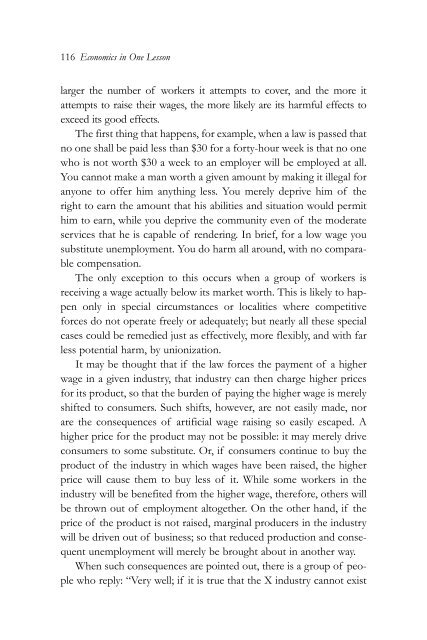1gDdM7w
1gDdM7w
1gDdM7w
- No tags were found...
Create successful ePaper yourself
Turn your PDF publications into a flip-book with our unique Google optimized e-Paper software.
116 Economics in One Lessonlarger the number of workers it attempts to cover, and the more itattempts to raise their wages, the more likely are its harmful effects toexceed its good effects.The first thing that happens, for example, when a law is passed thatno one shall be paid less than $30 for a forty-hour week is that no onewho is not worth $30 a week to an employer will be employed at all.You cannot make a man worth a given amount by making it illegal foranyone to offer him anything less. You merely deprive him of theright to earn the amount that his abilities and situation would permithim to earn, while you deprive the community even of the moderateservices that he is capable of rendering. In brief, for a low wage yousubstitute unemployment. You do harm all around, with no comparablecompensation.The only exception to this occurs when a group of workers isreceiving a wage actually below its market worth. This is likely to happenonly in special circumstances or localities where competitiveforces do not operate freely or adequately; but nearly all these specialcases could be remedied just as effectively, more flexibly, and with farless potential harm, by unionization.It may be thought that if the law forces the payment of a higherwage in a given industry, that industry can then charge higher pricesfor its product, so that the burden of paying the higher wage is merelyshifted to consumers. Such shifts, however, are not easily made, norare the consequences of artificial wage raising so easily escaped. Ahigher price for the product may not be possible: it may merely driveconsumers to some substitute. Or, if consumers continue to buy theproduct of the industry in which wages have been raised, the higherprice will cause them to buy less of it. While some workers in theindustry will be benefited from the higher wage, therefore, others willbe thrown out of employment altogether. On the other hand, if theprice of the product is not raised, marginal producers in the industrywill be driven out of business; so that reduced production and consequentunemployment will merely be brought about in another way.When such consequences are pointed out, there is a group of peoplewho reply: “Very well; if it is true that the X industry cannot exist


